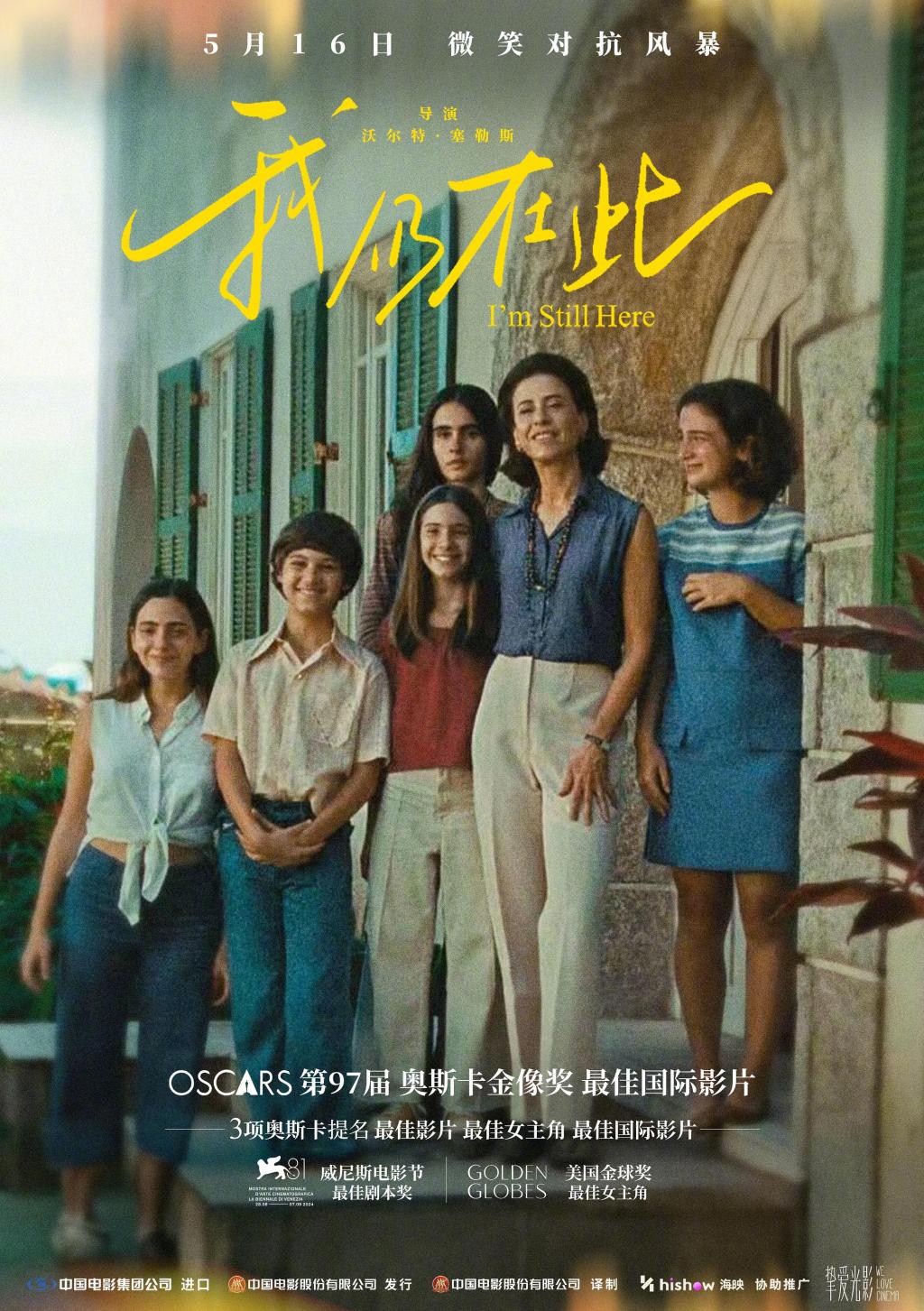
In March this year, the Brazilian film "I'm Still Here", directed by Walter Salles and adapted from a true story, won the Best International Film Award at the 97th Academy Awards, creating a historic milestone.
I'm Still Here is currently being screened in mainland China. Director Walter Salles has previously made a documentary about Chinese director Jia Zhangke. When communicating with Chinese audiences, he expressed his love for Jia Zhangke's works and his love for Chinese culture.

I'm Still Here poster
On May 25, a special film viewing event for the movie "I'm Still Here" was held in Shanghai. Director Walter Salles interacted with the audience via video link, sharing the film's creative process and artistic thinking, bringing a film dialogue across time and space to Shanghai movie fans.
Works directed by Walter Salles, such as "Central Station" and "The Motorcycle Diaries", have also been screened in China and received wide acclaim.

Movie viewing scene

Movie peripherals
Based on the true story of Eunice Paiva (Fernanda Torres), "I'm Still Here" tells the story of a mother in Brazil in the early 1970s whose family life was shattered by an accidental violent incident and she was forced to reshape her own story. The protagonist Eunice Paiva is the wife of former congressman Rubens Paiva, who was kidnapped and disappeared by the military government in 1971. Since then, Eunice has begun a 40-year struggle, bravely pursuing the truth and defending the human rights of Brazil's indigenous people.
The film is adapted from the memoirs of Marcelo Rubens Paiva, the son of the Paiva couple. It depicts sensational political past events, but the 40-year timeline is not entirely tense with panic and grief. It also records warm scenes such as beaches, ice cream, and family dinners. Eunice, her children, relatives and friends are accompanied by each other and move forward together, rebuilding and protecting a fortress of the soul with the tenacity of yearning for life.
Fernanda Torres, who plays Eunice, gave a wonderful performance in "I'm Still Here". The atmosphere in the first half of the film gradually shrinks towards her, but there is still a tenacious power in her eyes. After the torture, she returned home and scrubbed her skin vigorously in the bathroom, even if it hurt to peel off the dirty things from her body. Pain and strength, love and sadness make the image of this woman complex and full.
With "I'm Still Here", Fernanda Torres became the second Brazilian actress to be nominated for the Oscar for Best Actress. Coincidentally, her mother, Fernanda Montenegro, was the first Brazilian actress to be nominated for the award for her role in Walter Salles' "Central Station". The mother and daughter also collaborated in "I'm Still Here", playing the middle-aged and old age of the heroine Eunice respectively. The female blood outside the play is intertwined with the life of the image, and continues to flow in the changing times.

Director Walter Salles interacts with the audience online
After the screening, the audience had a long-awaited session - an online exchange with director Walter Sellers. Although they were on opposite sides of the world, Walter Sellers brought the audience closer with his enthusiastic attitude and sincere sharing. During the conversation, he was frequently surprised by the unique perspectives of the Chinese audience: "I have been interviewed by many media, but this is the first time I have heard such a question."
Director Salles said that it took him seven years to polish the script of "I'm Still Here" because he and the Paiva family in the film also had an intersection in real life. When he was 13 years old, he stayed at their house and played with the Paiva children. "The house you see in the film, from the lights in the room to the small furnishings, has left me with many vivid memories. The story recorded in the film is not only from Marcelo Rubens Paiva's memoirs, but also from my own experience and empathy." Therefore, while presenting the common memories with the Paiva family, adding the director's personal unique observations and balancing its authenticity and creativity is one of the difficulties of the film.
The protagonist of the film, Eunice Paiva, shows her strong female power as a wife and a mother. Eunice initially only wanted to protect her family, but eventually she became one of the leaders in Brazil's democratic reconstruction process. Salles did not fall into the cliché when dealing with this character. Whether she was detained and interrogated, running for her missing husband, or raising money to make a living and comfort her children...Eunice always remained calm and restrained, and never broke down and cried.


Eunice Paiva (Fernanda Torres)
Director Sellers said that this was one of his designs. "Eunice never cried once in public throughout the film because I didn't want Eunice to become emotional and refused to use a sensational approach. The audience will see that for the first time someone will use the characteristic of smiling to resist the power of the country. This is Eunice's own way of resistance, and it ultimately makes this character successful."
Director Salles is a loyal fan of Jia Zhangke and filmed the biographical documentary "Fenyang Boy Jia Zhangke" for Jia Zhangke in 2014. During the conversation, he also expressed the influence of Jia Zhangke's works and Chinese culture on himself: "I personally like Chinese landscape paintings very much. There are always some things in landscape paintings that are shrouded in mist and will not be completely painted, which stimulates the audience's speculation and imagination about the things in the painting. I agree with this design of leaving blank space in art. The same is true for Jia Zhangke's films. He will not explain the context of the stories, but just stay on the sensory level. This will allow the audience to think more deeply and understand what he wants to convey through the film."
After "I'm Still Here" won the Oscar, it caused a strong response in Brazil. When the news of the award came, Brazil held its annual carnival, which injected more enthusiasm into the street celebrations. At the viewing event, an audience member told director Sellers that he not only went to the Brazilian carnival, but also cosplayed as "Eunice" in "I'm Still Here" to pay tribute to her.
"I am deeply honored to thank the Chinese audience for their support!" Director Salles responded, saying that the fact that I Am Still Here became the first Brazilian film to win the "Best International Film" award in Oscar history just proves that film is such a close-knit and diverse cultural community with multiple voices. "In fact, when I was shooting this film, I would not have thought that I would have these wonderful encounters later. I am very happy that such a film that presents a more inclusive, just and equal Brazil can be loved by audiences all over the world. I hope that in the future no one in Brazil will experience what the Paiva family experienced in the film, and I believe that other Brazilian directors and works will continue to be recognized by awards such as the Oscars."

Audience


